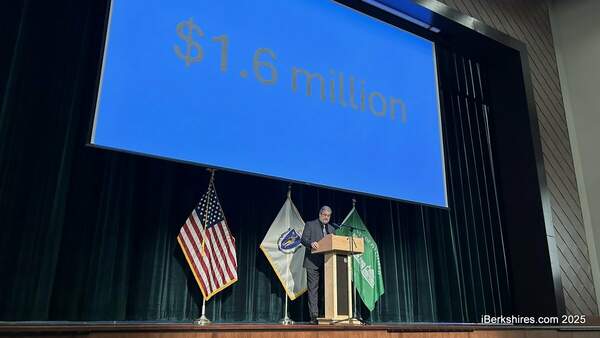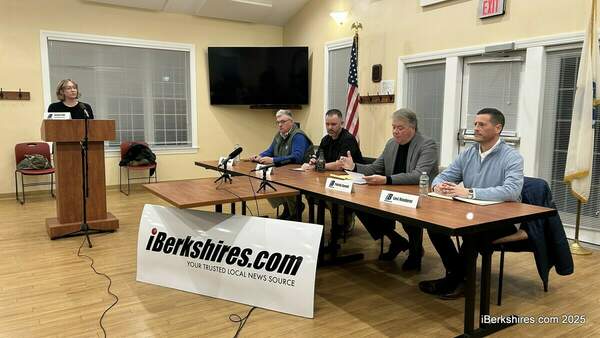
Pittsfield's A.J. Enchill Appointed to Healey-Driscoll Transition Committee
PITTSFIELD, Mass. — Berkshire County will have representation on the Healey-Driscoll administration's transition committee that deals with the workforce and economy.
Last week, it was announced that Pittsfield native A.J. Enchill, who is president and executive director of the Berkshire Black Economic Council, is serving as co-chair of the "jobs and a flourishing economy for all" policy committee.
"I'm grateful for that," he said earlier this week about the appointment. "Because it means that not only do we get to represent Berkshire County, but we get to represent our organization and our values and I get to bring my own personal skills, having worked in the Legislature to serve the commonwealth."
Enchill was the district aide for former state Sen. Adam Hinds, meeting with town officials and representatives from 32 towns to speak about the challenges and funding needs of their communities.
Another part of the position was helping people navigate bureaucratic systems, he explained, and connect them with liaisons in the statewide directory.
Gov.-elect Maura Healey and Lt. Gov.-elect Kimberley Driscoll developed six committees to address urgent needs in the commonwealth and help inform the transition from the Baker-Polito administration. Enchill's fellow co-chairs are Pam Eddinger, president of Bunker Hill Community College; JD Chesloff, president & CEO of the Massachusetts Business Roundtable; and Chrissy Lynch, chief of staff of Massachusetts AFL-CIO.
The panel is tasked with building a dynamic economy that reduces costs for people and businesses while lifting up workers.
Enchill sees a need to align employers with job seekers. He said there is not a lack of jobs, but that a lessened demand to return to work after the pandemic gave people time to decipher what purpose and fulfillment mean to them.
"If we want to have a flourishing economy, it means we have to have jobs that are meaningful to the seeker," he said. "And if we can find purpose and something meaningful in your job, I believe we can get people to return back to work."
Hiring is a two-way street, Enchill added.
"I think profit maximization is obviously important for any company to thrive but I think in all of that we somewhat lost the human-to-human connection between employer and employee," he said. "And if we can build that back and really improve those relationships so people enjoy their workplace, they'll come back."
The committee is starting with a survey to residents that will set a path for its work and is in the early stages of selecting a well-rounded range of members.
"Workforce is a lot of things. It's the job itself, it's the package, whether it's the benefits or the perks, the means of working, whether it's in person, remote, or a hybrid model, and connecting other wraparound needs and services to employment," Enchill said.
"So maybe for someone they need transportation, maybe for another person they need child care and if we can introduce wraparound services that are necessary for someone to thrive in the workplace and feel respected in the workplace, then we'll have a better economy because not only are we helping people and meeting them where they're at but we're giving them the excitement to return to work and that excitement to return increases the overall productivity."
His position on the committee represents both the needs of Western Massachusetts and the experiences of Black entrepreneurs.
"I think that on the one hand, being Black in the Berkshires means a lot of things but the ideas for how to improve and develop best practices for working with Black entrepreneurs are similar models that could be introduced to support entrepreneurs throughout the commonwealth," he explained.
"I think bringing this model to the committee will serve the committee and possibly other BIPOC communities as well and then secondly, the rural element of being from the Berkshires needs to be advocated for properly as well and that is just as important to us as it is to the commonwealth."
Enchill hopes that it all comes together so there is a meaningful report that can be used to activate the ideas introduced by the committee and give the new administration the right starting point.
The Berkshire Black Economic Council was first formed in 2019 and was incorporated in 2021. Recently, it received a 501(c)(3) nonprofit designation from the Internal Revenue Service.
The council provides technical assistance to Black entrepreneurs and Black-owned businesses and in Berkshire County with about 98 on its directory at the moment.
BBEC moved into its corner office space at 33 Dunham Mall, Suite 101, in August and is fully staffed with Enchill, an executive assistant, and a communications coordinator. The council hopes to hire an enrichment navigator in the new year.
"We're excited to get our name out there and let the community know that we're here," Enchill explained.
"We will have office hours for entrepreneurs so that they can come in and not only meet with us but work in our space and receive on-hand technical assistance from our office."
In his work, he has found that access to capital for startup costs is a common struggle for Black businesses.
"There's a lot of exhaustion and fatigue that Black entrepreneurs have experienced and therefore they're not as ready to jump for opportunities that could be to their benefit because they have been discriminated in the past or they've had to go through leaps and bounds for reasons that come about just because of their identity," he said.
"And we want to be here to advocate those challenges that they face and aid them through processes that can be complicated or archaic and help them get where they're going."
An important part of the office is to provide a space where Black entrepreneurs can know they are being supported and speak freely without having to police their ideas, thoughts, or experiences.
Enchill said he has heard a number of stories — some of which are horrific — and has been glad to be a responsive organization that can be leaned on for resources and information.
"That alone, despite all the other concepts and imaginations that I have for the potential of this organization, that in and of itself hasn't been done before in this way, and we will see economic development because of it," he said.
"And it's cool even just to connect entrepreneurs with other area organizations who are looking to partner with other Black businesses and to know that we can do that because we have those connections is awesome."
In April, the organization was awarded $700,000 in American Rescue Plan Act funds to establish organizational operations and capacity for its foundational work.
One of Enchill's future goals is to establish an incubator or center in downtown Pittsfield for entrepreneurs so that they can have a space to work from. He would like to have a place where they can pursue passion and creativity, have a multi-purpose facility for entrepreneurial growth, and have business coaching so that they can be self-sustaining.
Tags: small business,















